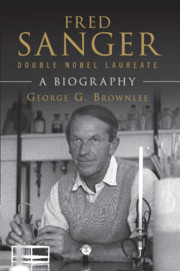Book contents
- Frontmatter
- Dedication
- Contents
- List of figures
- Foreword
- Acknowledgements and original sources
- Brief chronology
- Honours
- Introduction
- 1 A Quaker upbringing
- 2 How about studying insulin?
- 3 Radioactive sequencing of proteins and nucleic acids
- 4 Interview of Fred by the author in 1992: Early life
- 5 Interview of Fred by the author in 1992: Insulin and the Biochemistry Department, University of Cambridge
- 6 Interview of Fred by the author in 1992: Nucleic acids at the MRC Laboratory of Molecular Biology, Cambridge
- 7 Post-Sanger sequencing: high-throughput automated sequencing
- 8 Cancer: the impact of new-generation sequencing
- 9 Commentaries on Fred Sanger’s scientific legacy
- Epilogue
- Appendix: Complete bibliography of Fred Sanger
- Notes
- Index
- Plates
Foreword
Published online by Cambridge University Press: 05 November 2014
- Frontmatter
- Dedication
- Contents
- List of figures
- Foreword
- Acknowledgements and original sources
- Brief chronology
- Honours
- Introduction
- 1 A Quaker upbringing
- 2 How about studying insulin?
- 3 Radioactive sequencing of proteins and nucleic acids
- 4 Interview of Fred by the author in 1992: Early life
- 5 Interview of Fred by the author in 1992: Insulin and the Biochemistry Department, University of Cambridge
- 6 Interview of Fred by the author in 1992: Nucleic acids at the MRC Laboratory of Molecular Biology, Cambridge
- 7 Post-Sanger sequencing: high-throughput automated sequencing
- 8 Cancer: the impact of new-generation sequencing
- 9 Commentaries on Fred Sanger’s scientific legacy
- Epilogue
- Appendix: Complete bibliography of Fred Sanger
- Notes
- Index
- Plates
Summary
In the 1950s, biology was seen as such a soft science that it was not taught in the boys’ grammar school that I attended. Boys who wanted to study biology had to suffer the taunts of fellow pupils as they crossed the road for lessons at the high school for girls. That it is now a subject with a cutting edge (and fit for boys!) is due in large part to the scientific contributions of Fred Sanger. That such a modest, self-effacing man whose childhood nickname was ‘Mouse’ could have such a profound impact needed some explanation. In this biography, George Brownlee gives us that explanation.
When Fred Sanger joined the Laboratory of Molecular Biology (LMB) in Cambridge in 1962, he had already won a Nobel Prize for his work on the structure of insulin. This Nobel Prize was, appropriately, for chemistry, since he showed that proteins were proper chemicals, with a defined structure, and not some ill-defined mixture as thought by some. It was a discovery that opened up the chemistry of macromolecules, and created a new subject, distinct from the biochemistry of those days, that demanded a new name: molecular biology. In the LMB he turned his attention to the nucleic acids, no doubt influenced by the presence of Francis Crick’s Division of Molecular Genetics. While the molecular geneticists treated their central subject as a coding problem – how does the information in DNA end up as a sequence of amino acids – and used clever genetic tools to crack the problem, Sanger carried on with his chemist’s approach and developed powerful ways to sequence first RNA and then DNA. Along the way, as Brownlee describes, he made a number of important discoveries. And he introduced the notion that it was important to sequence entire genomes and then ask what the sequence told about the biology – an approach that is now called hypothesis-free discovery, carried out on a massive scale. But his work was not appreciated by all his colleagues. I once overheard Francis Crick remark: ‘The trouble with Fred is that he has developed all these powerful methods, but we can’t persuade him to do anything interesting with them.’
- Type
- Chapter
- Information
- Fred Sanger - Double Nobel LaureateA Biography, pp. xv - xviiPublisher: Cambridge University PressPrint publication year: 2014



